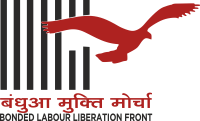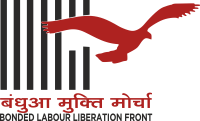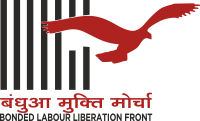About Us
About Bandhua Mukti Morcha
Bandhua Mukti Morcha ( Bonded Labour Liberation Front ) was founded in 1981 by Swami Agnivesh a highly evolved being, who threw away the glamour and comforts of a coveted Ministerial position in the government of Haryana and set out on the mission of waging a relentless war against the pernicious bonded labour system in India. He has been the re cipient of several National and International awards including Right Livelihood Award (Alternative Nobel Prize) 2004 for his outstanding work.
Bandhua Mukti Morcha is a body registered under the Societies Act, 1860. It is also registered with Ministry of Home Affairs under the Foreign Contribution Regulation Act. Since its inception, BMM has dedicated its activities to the identification, release and rehabilitation of bonded labourers who lead a hellish life of bondage, slavery and debt. Till date the Organization has secured release of over 1,78000 bonded labourers in the country of which 26,000 are children. A large number of them have been rehabilitated.
Slavery in various forms existed in India since past many centuries. Bonded labour system is a contemporary form of slavery and it includes Bonded Child labour. Both arise out of socio-economic and historical reasons. India is still home to an estimated 300 million bonded labourers and 65 million bonded child labourers notwithstanding the Constitutional guarantees, prohibitive laws like Bonded Labour System (Abolition) Act 1976, Child Labour (Prohibition & Regulation) Act 1986 and other International Conventions on the subject.
Child labour is mostly found in the unorganized sector. Children in the age group of 5 -15 are made to work in agriculture and industrial units producing matches, locks, carpets, handlooms, stone quarries, brick kiln, tanneries etc. Millions of children are born poor, with a debt burden hanging on them because their parents had taken a debt and had not been able to repay. They are unable to go to school or play and dream like a normal child because they have to work up to 16 hours a day to repay the debt of their parents. They are being sold off like commodities. This is called child slavery.
BMM has successfully fought legal and human rights battles on behalf of this exploited lot in the Supreme Court of India. Indian Parliament, United Nations Human Rights Commission, ILO and UNICEF have been sensitised on the issue. Yet, the 33 year-old struggle is only a beginning. A lot more remains to be done.
BMM was the first organization to crusade against the pernicious bonded labour system in India. Lack of political and administrative will to carry out the Constitutional mandate and enforce prohibitive laws failed to produce the desired results. It was on the historic PIL of BMM that Justice P N Bhagwati delivered his epoch making landmark judgement in 1983 declaring that all labourers who are denied common minimum wage, are to be presumed bonded labourers(3SCC 1984). Excerpts from the judgement:
Bandhua Mukti Morcha Vs Union of India and Others , 1984 SCC (3) 161 :– “Therefore, whenever it is shown that the labourer is made to provide forced labour, the Court would raise a presumption that he is required to do so in consideration of an advance or other economic consideration received by him and he is therefore a bonded labourer. This Presumption may be rebutted by the employer and also by the State Government if it so chooses but unless and until satisfactory material is produced for rebutting this presumption, the Court must proceed on the basis that the labourer is a bonded labourer entitled to the benefit of the provisions of the Act. The State Government cannot be permitted to repudiate its obligation to identify, release and rehabilitate the bonded labourers on the plea that though the concerned labourers may be providing forced labour, the State Government does not own any obligation to them unless and until they show in an appropriate legal proceeding conducted according to the rules of adversary system of justice, that they are bonded labourers”
Through various petitions, BMM has been seeking interventions of the court on different issues concerning bonded labourers. This has helped to wake up government machinery and bring them to action mode ensuring that as many as 7, 000 houses were constructed and allotted to the labourers released from bondage in the States of Haryana, Rajasthan, Tamil Nadu, Karnataka and Madhya Pradesh. Non-formalschools and health centres set up by BMM such asDayananda Shilp Vidyalaya, Garhi, New Delhi, Maharshi Dayananda Vidyalaya, Guna, Madhya Pradesh, Maharshi Dayananda Health Centre, Shivpuri, Madhya Pradesh and Sugam Vedashram in Nagapatnam, Tamil Nadu exemplify BMM’s commitment to provide education and health care to the poor and needy in slum areas and tribal belts.
BMM has been campaigning for a National Minimum Wage equivalent to the first-day salary of a class IV employee in Government service. It is also BMM’s view that any subsequent revision of such a minimum wage should be done on the basis of price index as in the case of Government employees. The State Governments could fix minimum wage according to the local conditions but it should not be below the National Minimum Wage.
BMM has made a demand for setting up a National Commission on Bonded Labour with sufficient judicial and financial powers but the government has failed to do it till date. BMM has therefore, constituted a Citizens’ Commission on Bonded and Child Labour, with eminent persons of political, social and judicial integrity as its Members. They include former Judges of the Supreme Court of India, eminent Artists, Journalists, Lawyers and Social Activists. Going by the fact that about 90 percent of the Bonded Labourers are from Scheduled Castes and Scheduled Tribes, BMM has been making efforts to engage members of these communities in various creative tasks for their holistic development.
Other areas in focus are casteism, discrimination against women (abominable Sati or bride burning), female foeticide, child marriage, drug abuse, rapes and domestic violence, religious fundamentalism & obscurantism, oppression, corruption, communalism and terrorism.


